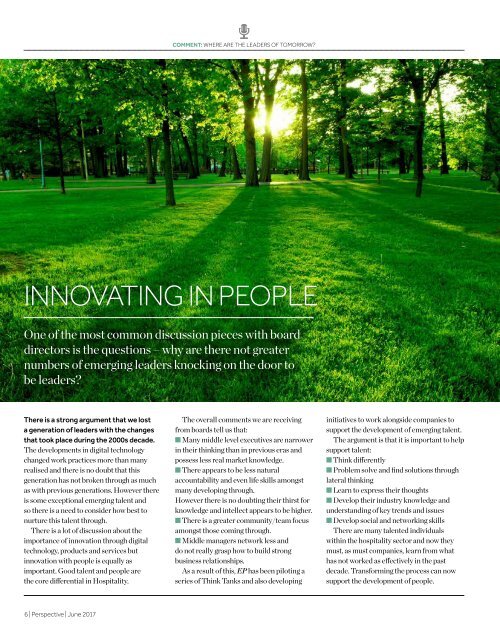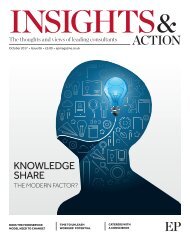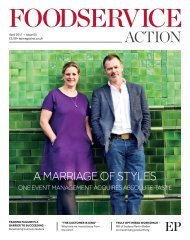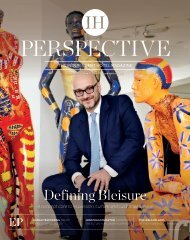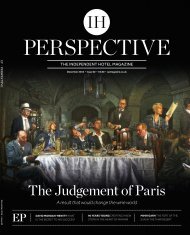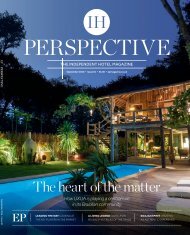EP Perspective June 2017
The title talks about the whole Hospitality sector, including the fine hotels, delicious restaurants, leading foodservice companies and the wider community. The magazine launched with a focus on independent hotels and has evolved to include thought leadership pieces on the whole sector. Articles focus on customer service, the guest experience, new innovation being adopted and much more. Their are many pacesetters in hospitality and EP is keen to showcase the real stories. Perspective is published on a quarterly basis and is written for senior players in hospitality. It is available in both a printed and digital format. Perspective puts a spotlight on some of the great things being achieved and the fascinating stories behind the businesses.
The title talks about the whole Hospitality sector, including the fine hotels, delicious restaurants, leading foodservice companies and the wider community.
The magazine launched with a focus on independent hotels and has evolved to include thought leadership pieces on the whole sector. Articles focus on customer service, the guest experience, new innovation being adopted and much more. Their are many pacesetters in hospitality and EP is keen to showcase the real stories.
Perspective is published on a quarterly basis and is written for senior players in hospitality. It is available in both a printed and digital format.
Perspective puts a spotlight on some of the great things being achieved and the fascinating stories behind the businesses.
You also want an ePaper? Increase the reach of your titles
YUMPU automatically turns print PDFs into web optimized ePapers that Google loves.
COMMENT: WHERE ARE THE LEADERS OF TOMORROW?<br />
INNOVATING IN PEOPLE<br />
One of the most common discussion pieces with board<br />
directors is the questions – why are there not greater<br />
numbers of emerging leaders knocking on the door to<br />
be leaders?<br />
There is a strong argument that we lost<br />
a generation of leaders with the changes<br />
that took place during the 2000s decade.<br />
The developments in digital technology<br />
changed work practices more than many<br />
realised and there is no doubt that this<br />
generation has not broken through as much<br />
as with previous generations. However there<br />
is some exceptional emerging talent and<br />
so there is a need to consider how best to<br />
nurture this talent through.<br />
There is a lot of discussion about the<br />
importance of innovation through digital<br />
technology, products and services but<br />
innovation with people is equally as<br />
important. Good talent and people are<br />
the core differential in Hospitality.<br />
The overall comments we are receiving<br />
from boards tell us that:<br />
n Many middle level executives are narrower<br />
in their thinking than in previous eras and<br />
possess less real market knowledge.<br />
n There appears to be less natural<br />
accountability and even life skills amongst<br />
many developing through.<br />
However there is no doubting their thirst for<br />
knowledge and intellect appears to be higher.<br />
n There is a greater community/team focus<br />
amongst those coming through.<br />
n Middle managers network less and<br />
do not really grasp how to build strong<br />
business relationships.<br />
As a result of this, <strong>EP</strong> has been piloting a<br />
series of Think Tanks and also developing<br />
initiatives to work alongside companies to<br />
support the development of emerging talent.<br />
The argument is that it is important to help<br />
support talent:<br />
n Think differently<br />
n Problem solve and find solutions through<br />
lateral thinking<br />
n Learn to express their thoughts<br />
n Develop their industry knowledge and<br />
understanding of key trends and issues<br />
n Develop social and networking skills<br />
There are many talented individuals<br />
within the hospitality sector and now they<br />
must, as must companies, learn from what<br />
has not worked as effectively in the past<br />
decade. Transforming the process can now<br />
support the development of people.<br />
© ELENATHEWISE | 123RF.COM<br />
Objective – The Development of Talent:<br />
There are many programmes that focus<br />
on talent development. However the core<br />
consistent areas that need support are:<br />
n Development of Industry and business<br />
knowledge and thinking<br />
n Development of old fashioned social skills<br />
and networking<br />
n Problem solving<br />
n Taking time to reflect and think differently<br />
It is important to recognise that the work<br />
day has changed and is far more demanding<br />
in terms of responding to emails (average<br />
150 per day) with little time for reflection<br />
and thought development. Clarity of thought<br />
is very important and difficult to achieve<br />
with this work load and social skills have now<br />
never been more important.<br />
DEMANDING WORK<br />
SCHEDULES HAVE<br />
RESULTED IN LESS<br />
MARKET KNOWLEDGE<br />
AND A DECREASE IN<br />
NETWORKING AND<br />
SOCIAL CONTACTS.<br />
The hard truth is that demanding work<br />
schedules have resulted in less market<br />
knowledge and a decrease in networking and<br />
social contacts. This was the basis of success for<br />
the baby boomers and needs to sit at the core<br />
of the skill set of any emerging leader. Building<br />
strong relationships and knowledge of the<br />
market are fundamental to long term success.<br />
There’s a reason that co-working space<br />
have risen in popularity. It gives people<br />
access to different networks, to engage, learn<br />
and be inspired by those around them. In<br />
businesses where there are employees with<br />
numerous backgrounds and skill sets, such<br />
innovative knowledge co-working can be<br />
achieved internally.<br />
Case studies show that:<br />
n Inclusive teams and work forces are more<br />
productive and deliver consistent strong results<br />
n People still buy people in business so the<br />
need is to develop relationships<br />
n Brands are less of importance than people<br />
and the offer<br />
n Clients are seeking greater understanding<br />
and proactivity from operators<br />
So the methodology that should be<br />
proposed now is a return to tried and tested<br />
models but with a framework that works<br />
alongside teams.<br />
Think Tanks:<br />
<strong>EP</strong> has piloted a series of Think Tank events<br />
which bring people together from across the<br />
industry. The popular sessions are conducted<br />
in a business, yet informal learning and<br />
networking environment. They are led by<br />
an experienced and proven industry leader<br />
who shares their own insights. Often the<br />
speakers have reinvented themselves and<br />
their insightful knowledge is unique and<br />
welcomed from the room. This learning<br />
allows the group to discuss key issues and<br />
topical points.<br />
The group are invited to participate in<br />
discussion, raise questions and both the<br />
speaker and the group sharing their thoughts.<br />
This allows participants the opportunity<br />
to reflect, to challenge their thinking and<br />
to be exposed to intelligence from across<br />
the industry.<br />
The monthly Think Tank events have<br />
between 20 to 30 attendees and take place<br />
either first thing in the morning or at the end<br />
of the working day to enable people to attend<br />
and fit into their working schedules.<br />
Bespoke Internal Leadership<br />
Innovation Think Tanks<br />
<strong>EP</strong> is now planning to create specialised<br />
bespoke Think Tank sessions for specific<br />
teams. It is important to challenge not just<br />
those that want to learn but also internal<br />
groups. The idea is to challenge them to take<br />
time to think beyond the day to day.<br />
By creating a framework for a session each<br />
month, a team can focus on the development<br />
of lateral thinking, reflection, market<br />
knowledge and problem solving.<br />
Leadership Hub<br />
<strong>EP</strong> is hosting six Leadership Innovation Hub<br />
events per year. These are, in simple terms,<br />
interactives lectures by Industry leaders.<br />
They are aimed for emerging talent and<br />
provide them the freedom to develop their<br />
thinking, build their own networks, and in<br />
turn add greater value in their business role.<br />
This is less normal business coaching and<br />
more focused on developing the core skills of:<br />
n Relationship building<br />
n Networking<br />
n Industry knowledge<br />
n Reflection<br />
It may sound a contradiction but the key<br />
in developing talent is to return to core social<br />
skills of the past.<br />
If you would like to find out more<br />
about <strong>EP</strong>’s work please contact<br />
Sarah.Freeman@epmagazine.co.uk<br />
020 7933 8771<br />
© RAWPIXEL | 123RF.COM<br />
6 | <strong>Perspective</strong> | <strong>June</strong> <strong>2017</strong> epmagazine.co.uk | 7


